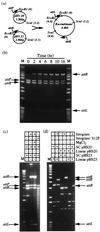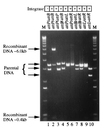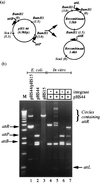In vitro site-specific integration of bacteriophage DNA catalyzed by a recombinase of the resolvase/invertase family
- PMID: 9576912
- PMCID: PMC20407
- DOI: 10.1073/pnas.95.10.5505
In vitro site-specific integration of bacteriophage DNA catalyzed by a recombinase of the resolvase/invertase family
Abstract
The genome of the broad host range Streptomyces temperate phage, phiC31, is known to integrate into the host chromosome via an enzyme that is a member of the resolvase/invertase family of site-specific recombinases. The recombination properties of this novel integrase on the phage and Streptomyces ambofaciens attachment sites, attP and attB, respectively, were investigated in the heterologous host, Escherichia coli, and in an in vitro assay by using purified integrase. The products of attP/B recombination, i.e., attL and attR, were identical to those obtained after integration of the prophage in S. ambofaciens. In the in vitro assay only buffer, purified integrase, and DNAs encoding attP and attB were required. Recombination occurred irrespective of whether the substrates were supercoiled or linear. A mutant integrase containing an S12F mutation was completely defective in recombination both in E. coli and in vitro. No recombination was observed between attB/attB, attP/attP, attL/R, or any combination of attB or attP with attL or attR, suggesting that excision of the prophage (attL/R recombination) requires an additional phage- or Streptomyces-encoded factor. Recombination could occur intramolecularly to cause deletion between appropriately orientated attP and attB sites. The results show that directionality in phiC31 integrase is strictly controlled by nonidentical recombination sites with no requirement to form the topologically defined structures that are more typical of the resolvases/invertases.
Figures





References
Publication types
MeSH terms
Substances
LinkOut - more resources
Full Text Sources
Other Literature Sources
Research Materials

